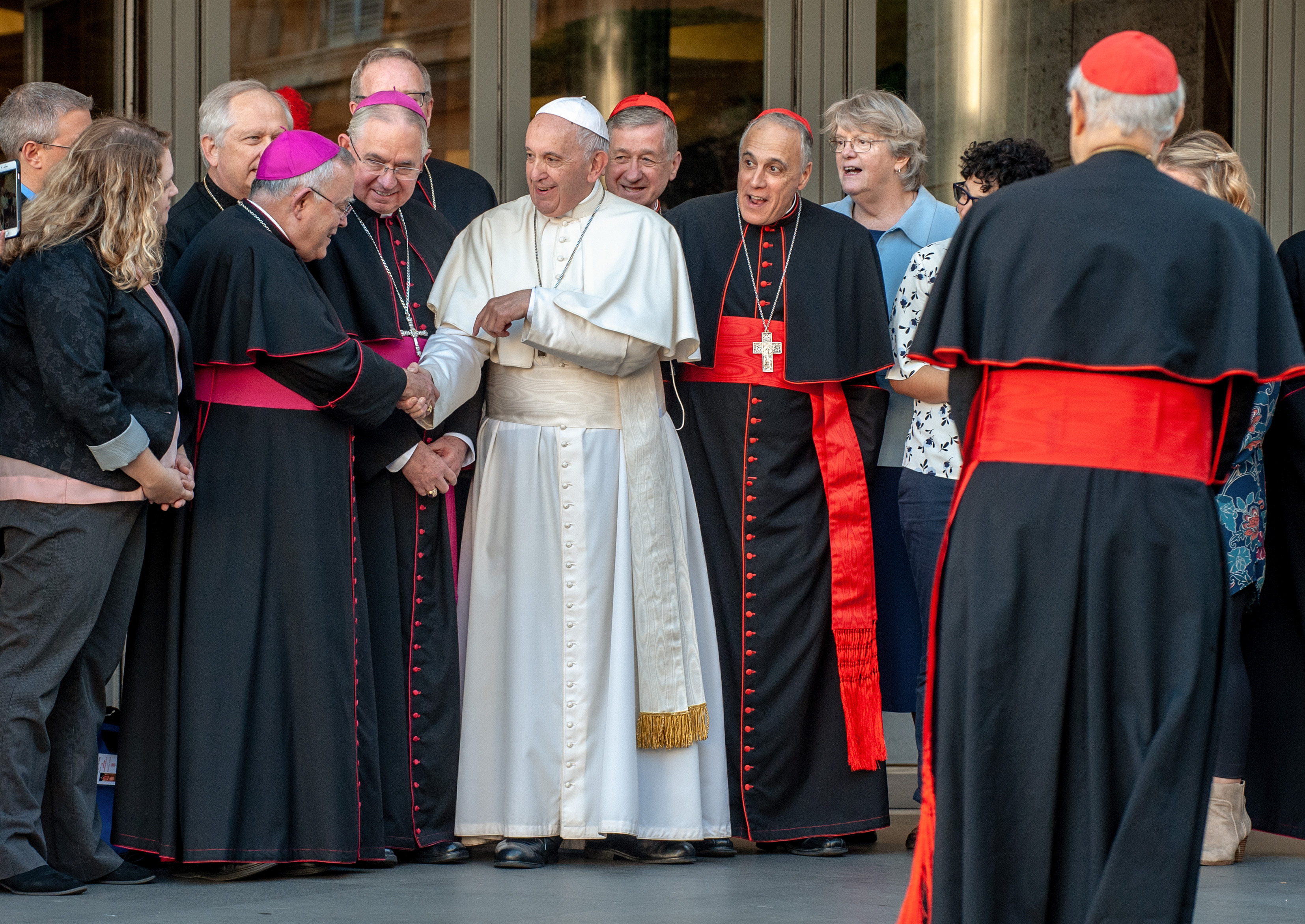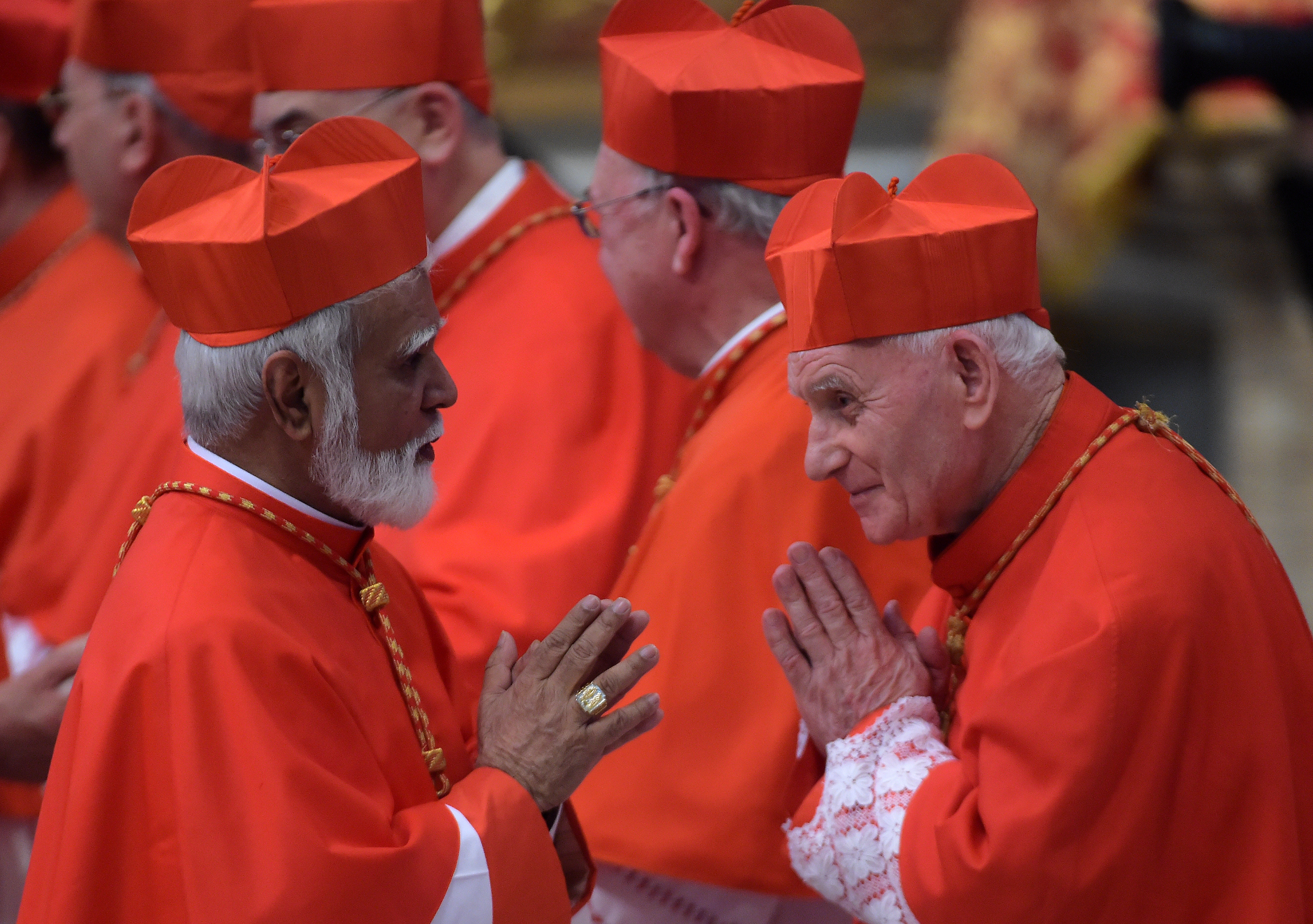The youth synod is not a liberal democracy but a process of discernment aimed at giving an “action plan” to churches on the ground to connect with future generations, according to the Cardinal Archbishop of Karachi, Joseph Coutts.
The Pakistan cardinal defined “synodality” – the emerging buzzword of the synod of bishops gathering which concludes today, Sunday 28 October – as a process of listening and “walking together” which goes beyond producing a text.
“It’s not just the document, but the process that we have gone through for nearly a month,” Cardinal Coutts told The Tablet during an interview at the Missionary Society of St Columban house in Rome.
“It’s up to us, the bishops and the bishops conferences to take the message of the synod and then to apply to it to our concrete situations. That is the challenge, and not just to take it as a document to be read and then put on the shelf.”
On Saturday 27 October bishops voted through the final synod document which calls for a missionary church which listens and "walks with" young people.
“It’s something like an action plan: ‘this is what we want to do, this is how we’d like to see things’,” the cardinal said of the final document.
He pointed out that the phrase “synodality” had come up in discussions during the month-long gathering, and stressed the synod of bishops differs to secular political structures and synods in other churches.
“It’s not the same as liberal democracy where everybody can vote, but its a walking together, it's listening,” Cardinal Coutts explained.
“The other idea of a synod in certain Protestant churches, [is] where it is more like accepting what the majority says,” he said. “Where they put things to a vote - an open democratic system – is not exactly the same as the Catholic Church. But yet that freedom was there, is there, to say what you want to say.”
The 73-year-old Karachi prelate, who attended the synod of bishops gathering on Asia in 1998, said a spirit of “open discussion” had developed inside the synod hall during the October assembly discussions focussed on young people, the faith and vocational discernment. And he said the 36 young people attending as observer-participants had played an active part.
“They gave a lot of input, and I would praise all the young delegates for their maturity, openness and the way in which they said what they wanted to say, and in the way, they related with others,” the cardinal explained. He added: “It was very significant that the Holy Father sits through the whole process, except once or twice when he had other commitments.”
Francis has taken the synod of bishops as a tool for his programme of church renewal and has indicated he wants “synodality” to become part of every area of Catholic life. A worldwide synod of bishops emerged out of the Second Vatican Council gathering of 1962-65, although synods go back to early Christianity and are biblically rooted in the Road to Emmaus story.
Coutts, who became Pakistan’s first cardinal since 1982 when he has given a red hat this summer, says he will try to apply the general principles in the final synod document into the Church in Pakistan.
“We are a small church, a young church, and historically young,” he said. “We are numerically small, and socio-economically we are on the lower level of society, in a country which is becoming more and more Islamic.”
Official figures conservatively estimate there are around 2 million Catholics out of a total population of 200 million in the Muslim-majority country. Christians in Pakistan, the cardinal explained, face discrimination at various levels in the country.
“We do face a lot of discrimination, that’s a fact. As non-Muslims, when it comes to promotions in your workplace in whichever job you are holding, being selected for higher studies such as medicine, engineering or other things, and that’s where we do feel discrimination.”
And he said the government has ruled that extra points in all public examinations are given to students who know the Koran off by heart, regardless of the subject. But Catholics in Pakistan, the cardinal stressed, are not “an immigrant Church” and “belong to the country as much as our Muslim fellow Pakistanis, and we needed to be treated as such and not just as a minority.”
During the interview, the cardinal discussed Asia Bibi, a Catholic woman condemned to death under Pakistan's blasphemy laws, a case that has attracted international attention. This month the country’s supreme court heard Bibi’s final appeal of her 2010 conviction although reserved their judgment until an unknown future date.
In 2009 Bibi was accused by two Muslim women co-workers of insulting the prophet Mohammed after they grew angry with Bibi for drinking from the same water tumbler as them.
“Nobody really knows what happened,” the cardinal said. “That’s the strange part of the story. We have no real evidence but some altercation obviously took place. Hot words must have been exchanged.”
He described the situation as “very unusual” because “we don’t know what was said, no idea,” and said that were Bibi released it could spark violence from extremists.
“I have confidence in our justice system,” he said.
But he said judges were under tremendous pressure, pointing out that one judge was killed after acquitting a boy accused of blasphemy twenty years ago.
“So which judge would stick out his neck for some poor woman called Asia, from some remote village. Why would he risk his life?”
He went on: “You’ve got to understand the kind of society we live in. It’s not all Muslims who are fanatics or extremists, but if a few fanatics are ready to use extreme means, violent means of attaining their ends, and naturally these are people to be feared. Because they are ready to kill and ready to be killed in the name of religion.
“There is a big difference in thinking between extremist groups, fanatic groups and the moderate, good-willed Muslims who are thinking differently.”
Cardinal Coutts is a respected figure across civic life in Pakistan and counts a large number of Muslims as friends. The difficulty, he said, was the rise in extremism over the last two decades.
He cited, as an example, the time he was invited to attend a Christmas celebration in a Madrassa where afterward Coutts, the Imam who hosted the event and another Muslim received death threats from an unknown Islamist extremist group.
“This shows that when you are talking about in Pakistan, you are not talking about a group of 200 million people all thinking the same,” he said. “There are extremist Muslims who would attack the Shia Muslims, and call them heretics.”
His strategy, the cardinal explained, is to have a “dialogue of life” which he says is embodied in the Church’s mission in the country. Catholic schools in Pakistan, open to everyone, have educated the country’s civil servants, officials, military officers, politicians including the late former prime minister Benazhir Bhutto.
The Archdiocese of Karachi has 56 schools and two hospitals.
“All our institutions, whether its a hospital, or work among the handicapped, or drug addicts or any kind of social work, its open to everybody,” the cardinal explained.
When it comes to religious education, Muslim pupils in Catholic schools are taught the Church's catechism while an Imam is brought in to teach religious instruction to Muslim pupils.
“When Christmas time comes, there are so many Muslim children who are eager to take part [in celebrations]. But we have to be very careful, nowadays. We say ‘no, you must get your parents approval first’,” the cardinal said.
While tensions are rising in Pakistan, the Karachi cardinal says that Islamic leaders valued the Pope’s decision to build bridges with the Muslim world and his de-linking of the Islamic faith from terrorism.
He explained the leader of one of Pakistan’s major Muslim parties, the Jamaat-e-Islami, came to see him after the Pope’s remarks on the papal plane back from World Youth Day in Krakow, 2016, just after the killing of French priest Fr Jacques Hamel, by Islamist extremists. During an in-flight press conference, Francis was asked about how to counteract “Islamic violence”, but the Pope replied saying he would not use the term instead stressing there were violent members in different religions.
“After this happened a few days later I received calls from the head of the Jamaat-e-Islami, a big Islamic party, that they wanted to meet me,” the cardinal said. “All they wanted to say was ‘we would like to thank the Pope, how can we do it?’ He has made a very important statement, and if he had said what the reporter was trying to get him to say he would have hurt the feelings of millions of Muslims, and it could have caused a lot of trouble and misunderstanding, he made a very wise statement’.”
Ordained a priest in 1971, and a bishop in Hyderabad in 1988, the cardinal went on to lead the diocese of Faisalabad and then was transferred to Karachi in 2012. For many years he has been the chairman of Caritas Pakistan and took a leading role in coordinating relief efforts following the 2005 earthquake in Kashmir.
His nomination as a cardinal this year came as a complete surprise and is something he says still trying to get his head around. In the country, however, it is being seen as “an honour for Pakistan.”
The cardinal stressed that some of the discrimination against Christians arose from the Islamic concept of “zimmi”, where the government or the ruler is a Muslim, the people are subjects rather than equal citizens and non-Muslims are supposed to pay a special tax known as “jizaya”.
“But Pakistan is not officially an Islamic state – we are a modern state. We do not have the ‘jizaya’ as such, and the founder of Pakistan, Mohamed Ali Jinah, was a very broad-minded, highly educated person. He was a barrister who had studied in the finest schools of law in the United Kingdom just like his contemporaries Gandhi and Nehru in India. And he envisioned a modern democratic state for Muslims – not a theocratic Islamic state.”



 Loading ...
Loading ...